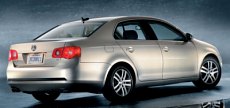|
 The
sedan version of Golf is produced exclusively in VW's Mexico plant
(i.e. the home to New Beetle) and supplied to USA and Canada. In
fact, if not American buyers prefer sedans to hatchbacks, VW would
not have created Jetta. The
sedan version of Golf is produced exclusively in VW's Mexico plant
(i.e. the home to New Beetle) and supplied to USA and Canada. In
fact, if not American buyers prefer sedans to hatchbacks, VW would
not have created Jetta.
Predictably,
the new Jetta shares the fifth generation Golf's sophisticated
chassis and first rate build quality. Its 2578 mm wheelbase is not
very long, but coupled to a lengthy trunk boosts the overall length
by 350 mm. Outside, the Jetta looks quite handsome. Some would say it
looks increasingly like a Honda, but that only reflects the improved
design of the Japanese company rather than any deterioration in
Volkswagen. In fact, the Jetta tries very hard to distinguish from
Golf. At the front end, it has a new chromed fascia grille (although
Golf GTI has a blackened version of the same grille); from the
C-pillar and afterwards, it looks more like the Phaeton. This is to
say the Jetta looks more graceful and expensive than the Golf.
In
the mechanical side, the main difference from Golf is the engine: the
American Jetta employs a larger, 2.5-litre inline-5 engine. It is not
the previous V5 (the costly engine died together with W8), but a new
engine said to be loosely based on Lamborghini Gallardo's V10.
Pardon? the V10 produces 500 horsepower, but the inline-5 only 150
hp. Can you believe? not me. Some said they share the same cylinder
head (well, maybe before machined, i.e., that piece of aluminum
alloy). Some said they share the same 82.5mm bore and 92.8mm stroke
(well, this only implies they are built with the same tooling). The
point is, the Lamborghini V10 has an aluminum block with dry sump
lubrication, VVT in all camshafts, 2-stage variable intake system,
lightweight pistons and con-rods, forged crankshaft… in contrast,
the Volkswagen inline-5 has a cast-iron block, wet sump, no VVT,
fixed intake manifolds… marketing people, stop telling me rubbish !
 Even
if you disregard the relationship with the Lamborghini V10, you will
be disappointed by its output. A specific output of only 60
horsepower per litre looks more like a 2-valve-per-cylinder engine,
but in fact this engine has twin-cam and 20 valves in total. If you
remember, the outgoing 2.3 V5 produces 170 horsepower. And the latest
BMW 2.5-litre six can produce 218 horsepower. With only 150
horsepower and 170 lbft of torque, accompany with a lazy manner (it
won't rev beyond 5800 rpm) and a hefty 1.5 ton weight, the new Jetta
is disappointingly slow. Car And Driver found a 6-speed
Tiptronic-equipped car taking 9.2 seconds to 60 mph. No wonder they
ran out of patience to measure 0-100 mph. Even
if you disregard the relationship with the Lamborghini V10, you will
be disappointed by its output. A specific output of only 60
horsepower per litre looks more like a 2-valve-per-cylinder engine,
but in fact this engine has twin-cam and 20 valves in total. If you
remember, the outgoing 2.3 V5 produces 170 horsepower. And the latest
BMW 2.5-litre six can produce 218 horsepower. With only 150
horsepower and 170 lbft of torque, accompany with a lazy manner (it
won't rev beyond 5800 rpm) and a hefty 1.5 ton weight, the new Jetta
is disappointingly slow. Car And Driver found a 6-speed
Tiptronic-equipped car taking 9.2 seconds to 60 mph. No wonder they
ran out of patience to measure 0-100 mph.
In
fact, Volkswagen seemed chosen a wrong strategy for the Jetta. Its
suspensions are set softer than Golf and the Michelin tires lacks
grip. This softened its driver appeal and failed to distinguish it
from the cheaper Japanese compact cars. Now it can only sell for
build quality and refinement.
Maybe
it is better to wait for GLI version, with 200 hp Turbo FSI engine.
It should bring much needed performance to the equation and you can
expect sportier suspension tuning and tires. Then all you need to
think is whether the little Jetta worth the same money as a Honda
Accord V6.
European Jetta:
after
renaming to Vento (in Mk3) and Bora (in Mk4), its name has been changed
back to Jetta. Engines are different from the American version: 115hp
1.6 FSI, 150hp 2.0 FSI, 200hp 2..0 TFSI, 105hp 1.9 TDI and 140hp 2.0
TDI 16V - actually the same as European Golf. |